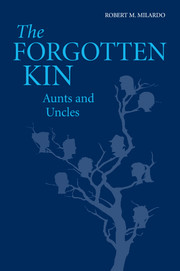Book contents
1 - Relational Landscapes
Published online by Cambridge University Press: 20 January 2010
Summary
Oddly enough, aunting and uncling have little clear representation in the public discourse about families. The relationships of aunts and uncles with nieces and nephews are rarely discussed or examined in any comprehensive way. Yet relationships among siblings are among the more resilient, long lasting, and intimate of family ties, and with the introduction of children, the roles of aunt and uncle are added to the mix of bonds linking siblings and their partners or spouses.
Even the terms aunting and uncling are relatively new; they appeared only recently in the popular and academic literatures on families, and then amid some controversy. Among the early appearances of the terms was an article I wrote and submitted for review to a leading academic journal. The article was published in due time, but not without some spirited exchanges. One of the reviewers questioned the terms aunting and uncling and lamented over their inclusion in the family lexicon, perhaps thinking they were unnecessary, unusual, or simply dreadful. The story illustrates the invisibility of the family work of aunts and uncles because specific terms to describe what they do are not in common usage. We have heretofore no common terms by which to describe our expectations of aunts and uncles or their typical activities and to differentiate them from the expectations and activities of other family members such as parents or grandparents.
- Type
- Chapter
- Information
- The Forgotten KinAunts and Uncles, pp. 1 - 29Publisher: Cambridge University PressPrint publication year: 2009



